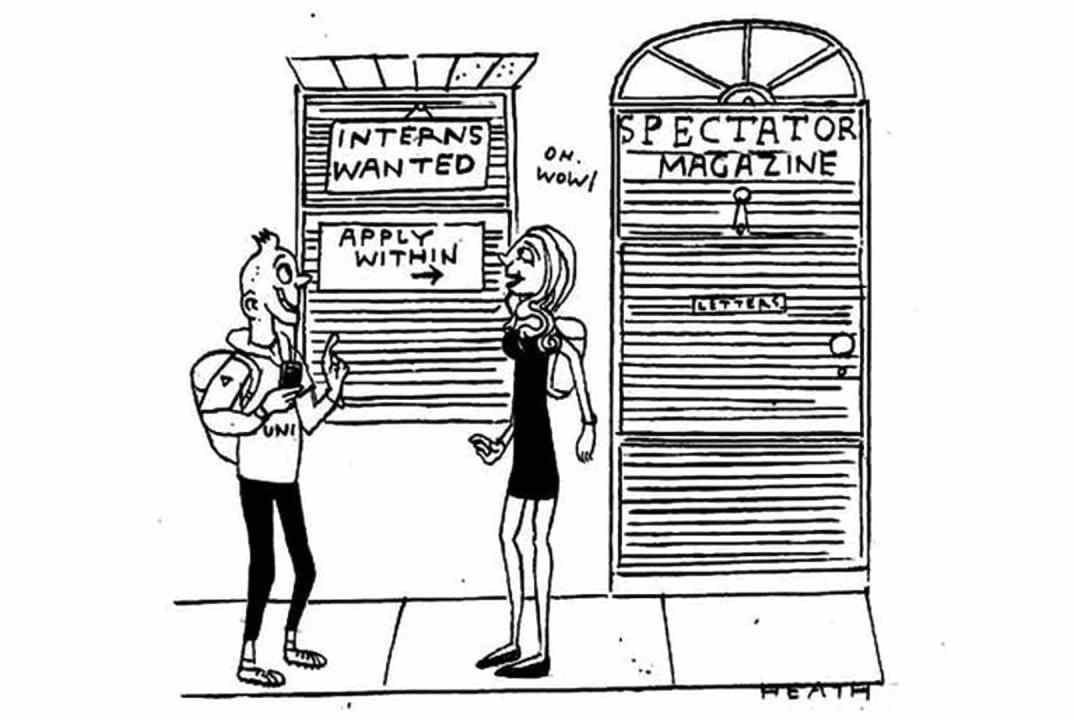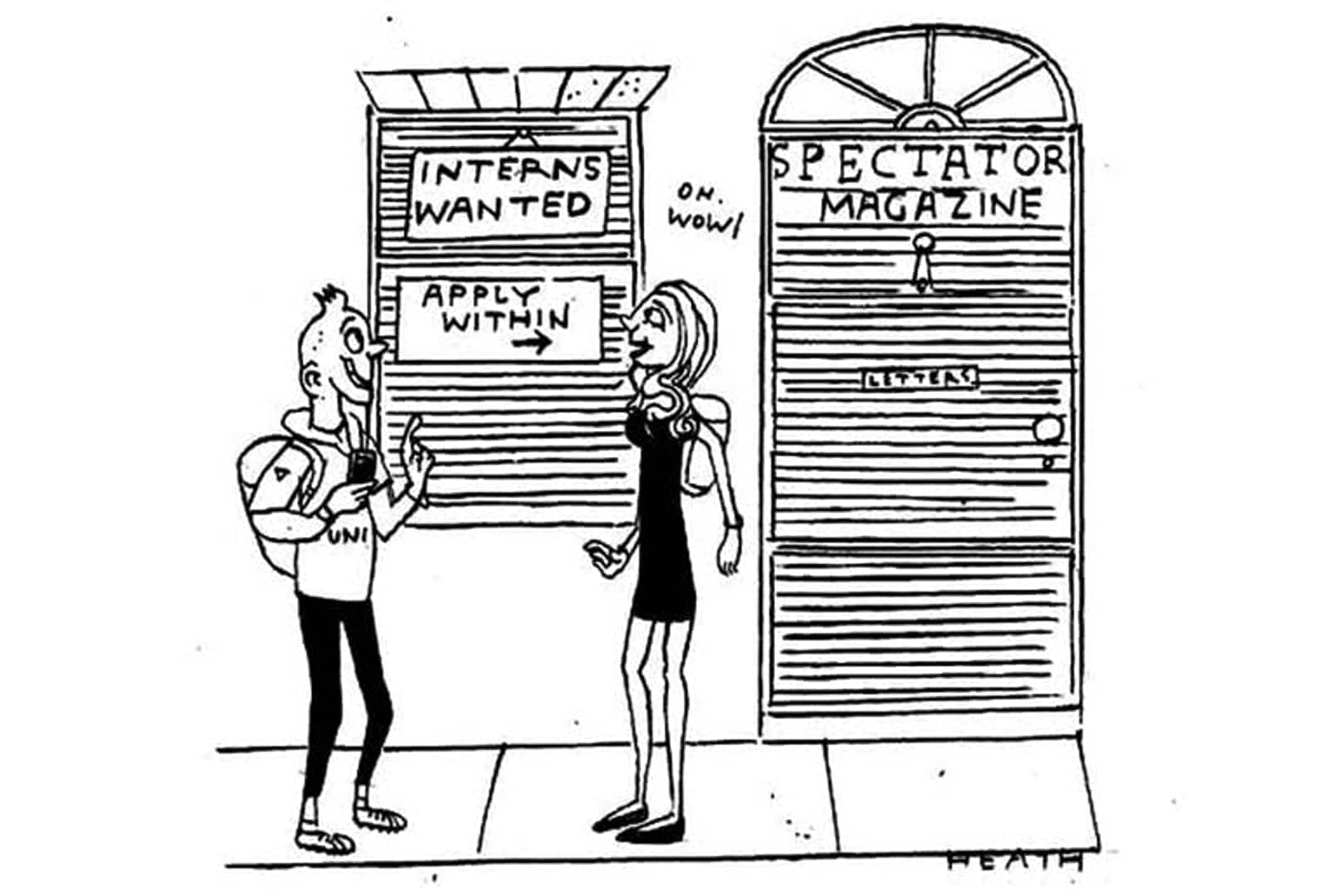2023 scheme is now live, click here
The Spectator’s internship scheme for 2022 is now open. We don’t ask for your CV and anonymise all entries – making our scheme the most genuinely open (and competitive) in national journalism. In our game, all that matters is talent – and we put a lot of work into finding that talent. Our internship scheme pays (but not very much) and we even provide help with accommodation for those who need it.
Our scheme is famously tough, so those who get a place often get job offers elsewhere. The Spectator will only ever be as good as the people we hire – and we find this method of hiring interns casts a net wide.
Over the years our interns (some of them now working at The Spectator) have been Lidl store managers, Oxford dons, career switchers, students (two have worked with us this year while completing their course), stay-at-home mums, teachers and lawyers. We recognise that a CV is a snapshot of how well (or not) things were going for someone at a particular point in their life and does not reveal true talent or potential.
We offer four types of internships (you can apply for as many as you like)
- Magazine
- Steerpike Political Mischief Internship
- Broadcast
- Research and Data
1) To apply for a magazine internship, complete at least two tasks from Part A and at least three tasks from Part B.
Part A:
- Name three ways we could improve a) our magazine and b) the website
- Suggest five people to get for either a diary or an interview – and any ideas on how you would get them
- Suggest a cover story and some potential authors
- Write a 300-word blog for Spectator Life or Coffee House
- What was your favourite Spectator magazine feature in the last year and why?
- Find a grammatical or factual error in anything the editor has written
- Suggest three new headlines for this Evelyn Waugh piece
Part B:
- Write an entertaining 150-word letter to The Spectator in response to a recent article
- Write a 250-word review of a book that hasn’t been reviewed yet in The Spectator
- Should Gen Z care about inflation? Discuss in 400 words
- In 300 words, make the case for the country which has had the most or least successful Covid policy
- In 350 words, make the case for The Spectator joining the metaverse
- Submit an entry for one of The Spectator’s recent writing Competitions (page 58 in this week’s magazine)
- Submit three possible entries for a Barometer column
- Choose an article from the foreign press on a subject The Spectator has yet to cover. In 200 words, outline how we should cover the subject
- Write a 350-word Notes On – relating to an intriguing subject that hasn’t yet been covered in the magazine
2) To apply for a Steerpike internship for Political Mischief, answer at least two questions from below:
- Which member of the Cabinet would win Squid Game and why?
- If you were Matt Hancock’s adviser, how would you plot his political comeback? Explain in a 300-word blog
- What is the most common name for a Tory MP and for a Labour MP?
- Pork barrel politics: Which constituency has received the most help from the government? Explain in a 300-word blog
- Write a 300-word Steerpike on a subject of your choice
- Send three topics for a Freedom of Information request
- Macron or Trudeau? Compare in a 300-word blog
3. To apply for a broadcast internship do at least one of the below tasks:
- Produce and present a podcast (maximum seven minutes) profiling a cabinet minister. Edit it using a free trial of Hindenburg
- Produce and present a short video making the case for or against a no-fly zone in Ukraine. Edit it using a free trial of Premiere Pro
And at least three of the below tasks:
- List potential guest line-ups for an episode of The Edition, based on three stories from a recent issue of The Spectator (one must be current affairs). Briefly explain why you chose each guest
- Point to three things we’re doing wrong with our current podcasts or Spectator TV
- Draft questions for a segment of The Edition, where Rod Liddle and Henry Kissinger are the guests, based on this article by Rod
- Make a clip and draft a tweet to promote a conversation from Spectator TV on Twitter. Here’s a previous example
- Pitch a new podcast or Spectator TV show
- Choose a song to play out an episode of Coffee House Shots. Tell us which episode, and why you chose the song
4. And for a research/data journalism internship, do these tasks:
- Please replicate any two of The Spectator’s data hub graphs using Datawrapper
- Find socioeconomic support for any two Beyonce or Destiny’s Child lyrics
- Find the equivalent of at least five of these for England or the UK
- How many times more likely are England’s poorest to die from avoidable causes than England’s richest? And how has this changed since 2001? You can show your answer in a graph
- (optional) Create a choropleth map with Datawrapper showing the vote percentage for Macron and Le Pen in each French department for the second round of the 2017 election
- (optional) Using Python and the Yahoo! Finance wrapper, create an automatically-updating Datawrapper graph for a commodity or stock price affected by the war in Ukraine
If you can do the Python task (or how to query Google Analytics) then you can win a paid internship place immediately as we have plenty of work for those who know how to analyse data. Email Fraser directly (and copy in internship@spectator.co.uk)
Send your answers with a covering letter and absolutely no CVs to internship@spectator.co.uk. Please write in the subject line which internship you are applying for. The deadline for applications is Friday 27 May but early applications are encouraged. I’d urge those who didn’t get through last time to have another go. The difference between the ten we select and the next, say, 50 is agonisingly small.
All candidates are assigned a city name (Tokyo, Perth etc.) and their applications are judged anonymously. We typically get 200 entries, which are whittled down to a top 50 then a top 25. These are scored out of 100 by three Spectator staffers and averages taken: offers are made to the top ten.
If you’re interested in a career in journalism – and want to test your ability in the most competitive application of its kind – then do consider us. And Oxbridge students: we’re serious about that no-CV thing. Any sneaky references (‘I edit my university newspaper, Cherwell’) etc. will be noticed.
Finally, while we do invite applications from everyone, we do ask:
- Not to bother if you have a job lined up as you’d be taking the space of someone for whom this could be life-changing
- We often recruit from our interns so we ask for you not to apply if you have more than two years of education left to run
- Have faith in yourself if you do not have connections or experience. Read Katherine Forster’s story. And in her words: ‘Just go for whatever you want to do. However unlikely or impossible it might seem, you never know what may happen.’
NOTE: Interns typically spend five days in the office (do tell us if there’s a specific week you’d like to work between June and October) and will be asked to do a wide range of tasks. These include some menial tasks (which all of us do at The Spectator); if this puts you off, don’t apply! Remedial support is available for PPE students.








Comments